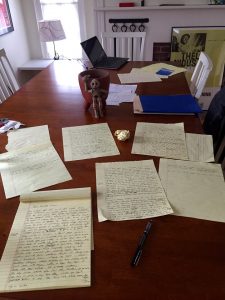 Vincent van Gogh would undoubtedly be at once bemused and bitter that his legacy is something beyond ubiquity: probably the most instantly recognizable modern painter, and practically a cliché for lazy descriptions of everything ranging from obsession to insanity. Taking the long view, his work endures, which is all he could have hoped for in the philosophical sense. But in the practical sense, is there another genius who better epitomizes the lonely and unacknowledged artist in search of the slightest sign or encouragement or assistance?
Vincent van Gogh would undoubtedly be at once bemused and bitter that his legacy is something beyond ubiquity: probably the most instantly recognizable modern painter, and practically a cliché for lazy descriptions of everything ranging from obsession to insanity. Taking the long view, his work endures, which is all he could have hoped for in the philosophical sense. But in the practical sense, is there another genius who better epitomizes the lonely and unacknowledged artist in search of the slightest sign or encouragement or assistance?
From one of the many letters to his brother and patron Theo, he wrote:
So I remain calm and confident through all this, and that influences my work, which attracts me more than ever, just because I feel I shall succeed. Not that I shall become anything extraordinary, but “ordinary,” and then I mean by ordinary, that my work will be sound and reasonable, and will have a right to exist, and will serve to some end.
Thinking of the fears and uncertainties he experienced, we can agree that they are, to a significant degree, part and parcel of the human condition. And yet, what ultimately derailed Van Gogh, and what undoes so many artists and authors, is the lack of funds and solidarity. A community that nurtures and inspires (and, on a more basic but crucial level, understands) creativity—how it happens, what it requires, who seeks to cultivate it more as calling than hobby—is essential. It’s on every individual to ascertain and walk their unique path, but what all writers share is the need for support (in all its forms) and reassurance that they’re not alone.
Check it out:
I have a vision of raising consciousness through culture—the arts—spreading hope and energy to create a feedback loop that is at once personal, universal and utterly positive, all furthering more creation and connection…letting it blossom and spread however it will. Who knows, it’s certainly grandiose, even absurd, but it makes sense and life is too short and meaningless if you don’t dedicate everything to your dreams.
 That’s from a journal entry dated January 1, 1997. I can look back and appreciate the optimism and clear-eyed personal call to arms, however naively conveyed.
That’s from a journal entry dated January 1, 1997. I can look back and appreciate the optimism and clear-eyed personal call to arms, however naively conveyed.
Still, little did I know there would be two more decades of direct and, admittedly, invaluable experience in the corporate world, learning skills I didn’t know I’d need, or would use in novel ways (literally). And, of course, an unimagined universe of failure, rejection, and, crucially, resolve. Slow and steady, more writing, more rejection, more revision, more false starts, more forced finishes, a lot more rejection and, above all, more resolve. And writing. Which, I reckon, makes me rather more than less like any other writer not fortunate enough to have invented their own franchise.
All of which is to say I could articulate the necessity of a tangible community for writers long before I knew such things existed, or were possible. Twenty years later, and with the help of some generous (in every sense of the word) backers, I decided to craft my best version of that vision. And so: 1455: A Place for Writers.
Why? And for whom?
As any sincere writer knows, it’s difficult to discuss inspiration and the mechanics (not to mention aspirations) of creativity without descending into platitudes or worse, sentimentality. Yet, just as any worthwhile writer is inspired to produce something that will have some small impact on someone else, 1455’s mission is to be a very concrete destination and haven, but also an idea that will invariably become “bigger” than itself. That’s to say, the energy, goodwill and passion of likeminded, honest writers—and those who support them—will necessarily live and grow as an entirely organic and positive phenomenon.


Being in a community of writers has the power to inspire and provoke thoughts and reflections that come along with being in a quiet and serene, safe place. It allows you the time and head space away from the mundane to really concentrate and explore your writing at the deepest of levels. Additionally, the life long friendships and support that follow are heartfelt in times of doubt as we struggle with our craft. A writing residency holds this power and more. It sustains the writer’s soul to be able to share work, discuss our stories and explore the very particular craft of writing itself. I have had the best of times during residency and can’t recommend them enough. I know Sean will strive for the best this venue has to offer.
JoAnn
Hey Sean, I think this is the kind of thing you are going for? If not, let me know if I can send anything else along. Hoping for a reunion of our Noepe pals. All best! Good luck.